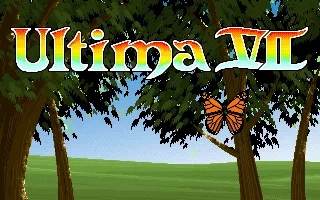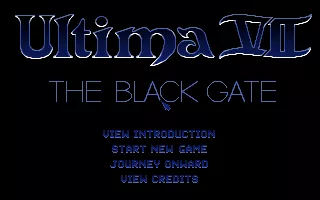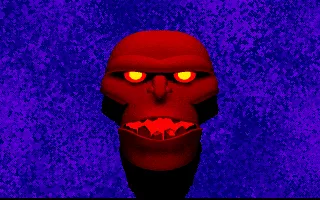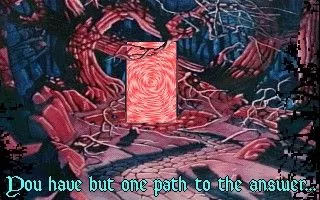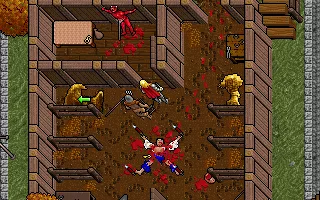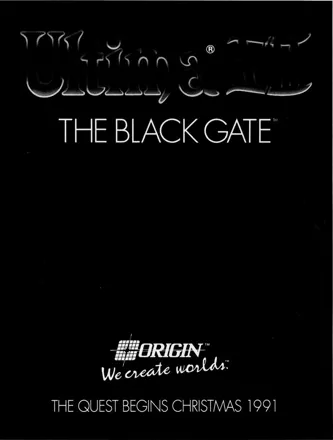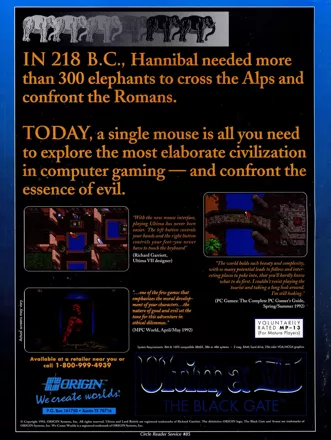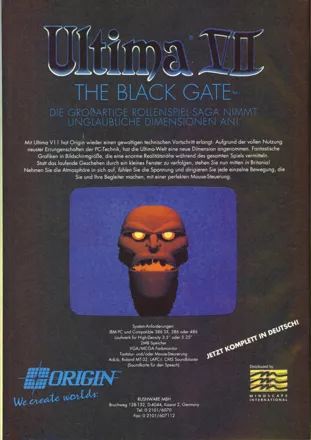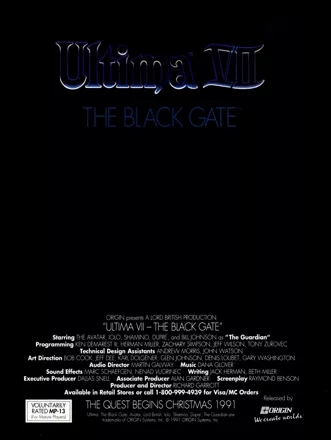Ultima VII: The Black Gate (1992) - MobyGames (original) (raw)
aka:Ultima 7,Ultima VII - Die schwarze Pforte,Ultima VII: La Porte Noire
Moby ID: 608
- Overview
- Credits
- Reviews
- Covers
- Screenshots
- Videos
- Promos
- Trivia
- Specs
- Releases
- Patches
- Prices
- Forum
- Contribute
Moby Score
8.3
#971 of 25.6K
Critics
83%(13)
Players
(100)
Review Ranking
- #24 on DOS
Collected By
178 players
Add-on (official)
Conversion (official)
Included in
Description official descriptions
The Avatar sees a strange message on his computer screen. An unknown being who calls himself the Guardian claims that Britannia has entered a true age of enlightenment, and soon everyone, including the Avatar himself, shall bow before the new lord. At this moment, a moongate materializes, and the Avatar steps through it into Britannia. He emerges in the city of Trinsic, where his old friend Iolo tells him that two hundred years have passed since his last visit. A horrible ritualistic murder has just occurred - the body of the local blacksmith was found in the stables. The Avatar learns that a new organization known as the Fellowship has been recruiting more and more followers recently. The champion of Britannia must solve the murder and find out about the Fellowship's true purpose, while still pursued by the ominous warnings of the mysterious Guardian.
Ultima VII: The Black Gate features revamped graphics and controls. The traditional Ultima top-down view of the world now fills the entire screen, with other informational windows overlaid on top of it only when necessary. Both world interaction and dialogue are fully mouse-controlled. Objects can be physically interacted with by dragging them with the mouse. Objects can also be stacked upon each other, and some puzzles are based on this feature. Equipment screen utilizes a "paper doll" concept: equipped items are graphically displayed on the character. It is also possible to physically manipulate inventory items, arranging them within bags and other containers.
The tactical combat system of previous Ultima games has been replaced with a real-time system where only general strategies can be set and party members fight automatically, the player taking control of the Avatar alone. Combat pauses when the player accesses the inventory. Leveling up system is similar to the previous games, the Avatar's parameters increasing automatically once a sufficient amount of experience points has been accumulated. The Avatar and his companions must regularly eat in order to stay alive.
The game's world is vast, populated by many non-playable characters with their own schedules. There are more extensive dialogue trees and individual conversation topics compared to the series' previous installments. As in the earlier Ultima games, the player is free to explore Britannia from the beginning of the game; certain tasks must be accomplished in a specific order to conclude the story.
Spellings
- 創世紀7:黑月之門 - Chinese spelling (traditional)
Groups +
- EA Classics releases
- Fantasy creatures: Dragons
- Fantasy creatures: Golems
- Fantasy creatures: Trolls
- Fantasy creatures: Unicorns
- Gameplay feature: Brothels
- Gameplay feature: Character development - Training
- Gameplay feature: Day / night cycle
- Gameplay feature: Fishing
- Gameplay feature: Hunger / Thirst
- Games with extra content copy protection
- Games with manual lookup copy protection
- Nudity
- Physical Bonus Content: World Map
- Protagonist: Female (option)
- Sound engine: AIL/Miles Sound System
- Ultima series
- Ultima universe
Screenshots
Promos
Credits (DOS version)
80 People · View all
Reviews
Critics
Average score: 83% (based on 13 ratings)
Players
Average score: 4.2 out of 5(based on 100 ratings with 8 reviews)
Dost thou understand now what a legendary game this is, milord?
The Good
Origin's Ultima series have always occupied a very special place in the world of role-playing games. Less "hardcore" and more loose in their adherence to the canons of the genre than the heavyweight Wizardry and the compromising Might and Magic, it has an arguably smaller, but more dedicated and passionate fanbase appreciating what those games do like no other: create worlds. True to the developers' slogan, the Ultimas know how to involve and immerse through magnanimous, beautifully interactive gameplay and utmost attention to detail.
Of all the games in this splendid series, Ultima VII remains the most accessible one to modern player without sacrificing gameplay elements that were sorely missed in its few successors. Old-time Ultima purists may accuse it of toning down RPG elements to the point of turning into a hybrid with adventure tendencies; the truth is, the game was simply way ahead of its time focusing on such aspects of RPG design that became prominent and even ubiquitous much later. For Ultima VII, role-playing is, above all, physical and mental immersion. Yes, it neglects stats - but what weight do stats have in the wake of meticulously crafted environment offering unseen interaction possibilities, and gigantic chunks of well-written text and information accessible through dialogue and books? Such is the genius of this game that almost no RPG released afterwards could escape its influence. It extends a titanic hand into the future, intimidating followers with the scope and power of its work.
Of course, we mustn't forget how much this game owes to its predecessors. The fifth game introduced a dynamic world with some interactivity; the sixth expanded it, improved the writing, increased immersion with its seamless exploration. Ultima VII goes one step further: its more advanced engine allows not only the much-needed full-screen navigation, but also a simple interface based on clicking and dragging. Instead of selecting options like "Get" or "Drop", you actually perform those actions by yourself now. This may seem like a minor enhancement, but in reality it is a highly important step towards the goal of physical immersion. Ultima VII paves the way for future 3D games by making its world consist of independent, mobile objects rather than simply be a still painting. Every object you see lives its own life; you can rearrange almost everything you see in a manner that will be later described as "sandbox" style. Today we hear a lot of such expressions as "open world", "fully interactive environments", etc.; now think of all those modern games to which those definitions apply only with serious limitations, if at all, and compare them to what was achieved in those fields by Ultima VII at the time when the entire concept and its significance were not yet grasped and defined.
You can do anything in this game. You can light candles, play harpsichords, break doors, rob banks, bake bread, make clothes, navigate ships, sleep with whores, and collect pumpkins. Note: I mentioned only the activities you can do - none of those are required from you in order to finish the game. Everything can be interacted with, and I do mean everything. You can go into a house, get a pair of boots and wear them, read all the books on the bookshelf, break a barrel in the kitchen, take some mutton from a crate and eat it, then take a goose quill from the table in the living room, put in on the owner's bed, wake him up, and sleep in the bed instead of him. Your mouse cursor can access everything your eye meets. With all its sophisticated material, the game brilliantly caters to our basic gamer instincts: curiosity and greed. Every player is naturally curious and wants to see everything a game offers. But you'll never achieve this goal in Ultima VII, unless you wish to dedicate to it all the time you spend with other games - it has too much to offer.
Equally important is the interaction with people. In most RPGs non-playable characters are there to supply information, or, in best case, play an important role in the story. You always feel those NPCs are somehow connected to you and to the game you are now playing, but have no lives of their own. The NPCs in Ultima VII, on the other hand, live their own lives. Most of them have nothing to do with you and with your quest. They are there because they are. Any time you talk to an NPC, you talk to a real person who is not related to your grand quest and has his own little joys and troubles. Also, those NPCs are dynamic. You can count on one hand the amount of games that paid attention to NPC routines after Ultima VII. The inhabitants of Britannia pursue their own schedules. You can stalk any character and watch his movements - it can be a fascinating process. You can witness how he wakes up in the morning. Then he probably goes to his shop (if he is a shopkeeper), or to his place of work. In the evening you can meet him in the local tavern drinking some beer and talking with friends. Then he goes back home and sleeps at night. Sounds simple, right? But how many RPGs actually introduced such characters? And I'm talking of every single NPC in the game here, not just some "chosen" characters who have something to do with the plot.
The NPCs are interesting not only because they move or because they have their own schedules. If you talk to an NPC, he will talk to you about what is important to him, like any normal person, instead of immediately giving you information connected to the game. He will tell you his name, his occupation, and might also talk to you about his problems, his love life, his business, or his family. If you've talked enough, he will probably also refer to his city, share recent news, etc. In other words - you will have a normal conversation with a real person, not some kind of a robot who directs you towards the next goal as soon as you start talking to him, or spills out one generic phrase about the overall state of business in town. There is an enormous amount of NPCs in the game, and an enormous amount of different character types among them.
The game world is huge, and at any given moment you can explore it to the full and visit every spot in it. Particularly noteworthy are the towns: instead of generic little settlements composed out of several houses you visit large cities with several streets and tons of various establishments. There are also plenty of books in the game. Some contain useful gameplay or story tips, but most of them are there just to enhance the experience. In short, the game truly has a living, breathing world, and that is achieved through creativity and attention to detail, not through fancy 3D graphics with billions of polygons.
The freedom of action is exhilarating. You can kill anyone or steal anything. Of course, you'll have to bear the consequences - the guards will attack you, party members will leave you - but the moral choice is yours. For example, there are three ways of getting money in the game - explore dungeons and find treasure, work and earn it, or simply steal the cash. Getting food is another matter of choice - you can buy it in taverns, you can hunt wild animals, you can steal food from people in towns, or you can kill cows in villages and eat their meat. Settle down, specialize in a profession, spend your life gambling and whoring, be as good or as bad as you want to - the choice is yours.
Ultima VII is wonderfully flexible in its treatment of hostile encounters. As far as I can recall, there are only three major battles you are required to participate in so that you'll be able to complete the game. You can run away from most regular skirmishes - but those who are nostalgic for old-school gameplay will find dungeons with enemies, traps, and loot. Ultima VII favors creative approach to problem-solving over brute force. There are often multiple solutions to the game's puzzles, and they are always natural and imaginative at the same time. Many puzzles are rather hard and require quite a bit of searching and experimenting. There are also some really original physical puzzles made possible with the fantastic engine. For example, one puzzle involves accessing a door that is too high for you to reach. You need to put a crate near a table, climb on that table, and then make stairs out of crates. Another type of puzzles involves magic: if, for instance, you want to pull a lever you can't access, you can cast the spell Telekinesis on it. If a trap creates impenetrable energy fields, you should use the magic Dispel Field that will make them disappear.
The plot of Ultima VII is quite interesting and starts with a gruesome murder you, as the Avatar, must investigate. The "big bad guy" watches you from behind the stage, but never gets involved in action himself, so that your actual enemies in the game are members of a pseudo-religious organization, whose leader is very truthfully portrayed and certainly belongs to the more memorable villain characters video games have to offer. There is an abundance of sub-quests and sub-plots, some of which surpass the main story in quality. Particularly memorable is the Skara Brae quest. An entire town has been burnt down because of an unfortunate accident - who is to blame for it? The person who started the fire puts all the blame on himself, but is he really the one morally responsible? There is also a blacksmith in the town who refuses to accept his own death because his spirit is driven by vengeance against the one who took his beloved wife away from him. In the end, one of the town's inhabitants has to sacrifice himself in order to save it, but nobody wants to do it, and the town's mayor, who was never known for being particularly brave or virtuous, has to do it himself. Till the very end he still hopes someone else will take this burden from him - but here it is, the last step before death, and the mayor says: "I was not a good mayor when I was alive, but at least I will be known as a good mayor after I die". It is just a minor sub-plot in a huge game, but how much care, creativity, and soul was put into it!
Ultima VII has some genuinely warm humor that makes us feel closer to the inhabitants of Britannia. I particularly liked the remarks of your companions. When your party sees a naked woman in one of the dungeons, the young boy Spark looks at her body with an intense interest, and Iolo sternly tells him: "Close your mouth, boy, otherwise an insect will go inside". On another occasion, you meet a love fairy who keeps telling you how much she loves you and what a bunch of handsome men you are, and Shamino utters with regret: "If only you were a bit bigger...", My favorite humorous situation in the game was the meeting with a unicorn. According to a popular mythological concept, unicorns can only communicate with virgins, so when he addresses you an awkward silences ensues, broken only by Iolo's and Shamino's attempts to console you: "You shouldn't be ashamed of that..." "You had so much to do...". But if you visit the unicorn after you have slept with a whore in Buccaneer's Den, he will refuse to communicate with you! This is what you call real depth in a game.
The Bad
The most obvious drawback of the game is the new real-time combat. While the option to streamline battles can be a good thing under the right circumstances, it appears that the developers only went for that and neglected other aspects such as tactical management, positioning, etc. Basically, combat in the game boils down to switching to the attack mode and watching how your fairly inept companions hit each other or waste valuable arrows and bolts on a measly rat. You always have very little HP and can be killed in a few blows, but so can your opponents - a feature than often turns the battles into continuous save-and-reload affairs. Combat is also generally too easy, and even some of the later boss battles can be resolved in under one minute.
Ultima veterans would probably frown upon certain aspects that were slightly simplified in this installment. You can no longer type during conversations, and crucial keywords would pop out even if you just stumbled upon them by accident. The overworld is huge, but the dungeons are a bit underwhelming compared to the previous games, and a few well-known places (such as the sewers in Britannia) are missing.
There are a few smaller issues mostly caused by the interface. Item management can be confusing: objects that are crucial to the plot look just like any others and can be lost very easily - especially if you give them to your companions, who tend to drop items when they get wounded in combat and run away. The problem is that often you don't get enough clues as to which items are really important; even worse, you could get an important item before you actually know you need it, and then throw it out. Imagine the frustration of going through the entire game and suddenly realizing that you've thrown out something needed to complete the it and can't remember where you did that. This forces you to keep and to carry with you all kinds of weird items - half of which are probably pure junk - in fear of losing something important and therefore being unable to complete the game.
The Bottom Line
Ultima VII is an outstandingly rich and detailed game set in an enormously engrossing, marvelously interactive world. It is a monster of a game, a veritable behemoth, a wonder of programming and generous creativity. Like its predecessors, it was way ahead of its time and set new design standards for generations to come. Its nearly perfect union of open-ended exploration, physical immersion, and strong, plot-oriented writing influenced the entire further development of role-playing games like few other titles before or after it.
DOS · by Unicorn Lynx (181674) · 2014
Ultima IV to VI fans, STAY away!
The Good
I tried. I couldn't. I didn't. And I still don't.
The Bad
This is not an RPG like Ultima IV, V, and VI were RPGs. This plays more like an adventure game and should not have been labeled Ultima VII. It might have stood on its own as Ultima Adventures I or something like that, but don't tell me this one is inheriting the tradition of excellent RPGs handed down from its predecessors.
The Bottom Line
If you like Police Quest, King's Quest, et al Quests, you may like this one. But for me, this marks the turning point where the Ultima dream world became a nightmare.
DOS · by Yeah Right (50) · 2000
A lush, vibrant medieval gameworld full of life, intrigue, and adventure
The Good
Ultima VII: The Black Gate follows in the rich tradition of the thirteen-title Ultima series. While the user interface of Ultima VI took up over half the screen, Ultima VII showcased the latest 486 technology of its day -- 1992 -- with lush, well-animated, full screen graphics. What really strikes me about this game, even today, is just how bright and colorful everything is. Along with some of the cheerier titles from Nintendo, Ultima VII sticks out as one of the most visually-pleasing games ever created, from the standpoint of color palette. Now, Ultima does have a day-night cycle, and there are miles of dungeons to crawl, so travelling without a torch may result in a dark, drab world. But hey, if it's night, you can bunk down on the nearest bed for however many hours you choose and wake up to a glorious sunlit morning.
Second most on my list of stand-out features of Ultima VII is the lively feel to the gameworld. Every one of the hundreds of NPCs in Britannia is programmed with a daily schedule. Britain's baker will go to work each morning and make his bread, in the evening head to the local watering hole for a pint of ale and some music, and retire to his home as the evening wears on. Oh yes, and you yourself can make bread: open the bag of flour, spread some on the table, add water to make a ball of dough, place it by the fire, wait a bit, and voila, one loaf of bread. The baker even pays you for your product, although trekking the wilderness looking for loot, or turning to a criminal life is far more profitable (and fun).
Further enhancing the real-life feel is exceptionally well-written NPC dialog. Characters are given real lives through dialog, instead of simply serving the plotline. And, unlike previous Ultimas, everything is mouse driven, so there's no more hunting for keywords; all the topics of conversation are laid out before you as you uncover them. The two basic topics that everyone will cover are Name and Job, which come to think of it are the two things that people in the real world and likely to ask you.
The grandest thing about Ultima VII though, is just how great it is to get out of the starting town, Trinsic, and explore the vast world of Britannia. Unlike the Elder Scrolls series, you cannot simply go wherever you please immediately. The main continent is large, but parts of it require long, winding, dangerous journey. Furthermore, there are dozens of islands that may only be reached by teleportation (which is hazardous and takes some time to figure out), by purchasing a ship (which takes a long time to afford), or by flying carpet (of which there is only one in the game, unlikely to be stumbled upon by a new player).
Monsters are varied and creative. There's your standard Ultima menagerie of gargoyles (most of whom are friendly), harpies, wolves, and then more fantastical creations like corpsers, who live underground and reveal only a biting tentacle, and headlesses, which, as the name suggests, are human in every respect except for missing one cranium. Just don't ask me how they eat or breathe.
Lastly, the plot of Ultima VII is a classic murder mystery, though the murders are particularly gruesome, and the ultimate cause of Britannia's strife is an otherworldly denizen called The Guardian. This red-skinned fellow constantly mocks and chides you throughout your adventure, with fully-functional voice acting that was groundbreaking for its time. The Guardian stands out in my mind as of the greatest villains in video game history, and your struggles with him continue for the rest of the Ultima VII-IX trilogy.
The Bad
I think that the real joy of playing through Ultima VII is the exploration. After you have discovered every cache, every secret door, every little nook of every little dungeon, what more will you do? The plot isn't really that compelling. It's alright, but you can lose track of what you need to be doing next. Or lose interest.
Combat isn't really anything special. It's more a matter of equipping your characters well, levelling them up before taking on the dragons, and playing prudently. Most of the battle is done automatically by your characters. Combat spells feel a bit inessential and may even do more harm than good. Delayed Blast... Armeggeddon? Yikes.
So in short, the gameplay is good but not great, in terms of the crucial game mechanic of fighting monsters (or people). To compare it with more interesting combat engines, we have Baldur's Gate (which is in itself problematic), or EverQuest (actually very rewarding when all goes well.) But in 1992 you wouldn't think to complain too much. You had Origin's other hit series for more visceral and engaging combat: Wing Commander.
The Bottom Line
Ultima VII: The Black Gate is an exceptionally well-put-together title from Origin, perhaps the best in their highly successful stable. Richard Garriott himself, the creator of the Ultima series, has stated that it is one of his two personal favorites, and the most masterfully-executed of the bunch. Thumbs way up, and moreso because it runs on modern machines thanks to shell program called Exult, created pro-bono by a group of dedicated fans.
This was an inspirational game for me back when I was 13... but in 2007 I could not in all honesty recommend it when the gaming industry has progressed so far, unless you are a real RPG fanatic, in which case you probably already know and love the Ultima franchise.
DOS · by Chris Wright (85) · 2011
Discussion
| Subject | By | Date |
|---|---|---|
| Fame and fortune await! Or at least a footnote | DJP Mom (11333) | Mar 19, 2008 |
Trivia
1001 Video Games
Ultima VII appears in the book 1001 Video Games You Must Play Before You Die by General Editor Tony Mott.
Armageddon
There is a high level spell called Armageddon which kills every person in the game except for yourself and Lord British. If you go back and talk to him he will exclaim "What have you done!?!"
Credits
- If you sit through the credits then another option will be available to view quotes humourous quotes from the development staff. At the end of this the butterfly from the intro floats onto the screen then blows up, followed by an evil cackle from the Guardian, apparently uttering gibberish. However, it is simply a sound sample that is played backwards. When reversed, The Guardian says "I am the Pagan Lord", apparently an early hint at the sequel. A recording is available at the Ultima Dragons FTP Archive.
- As an interesting testament to the credibility of the Ultima VII end credits, EA , far far later, actually took "Voluntarily rated MP-13 (for Mature Players)" logo from the game credits and put that to the The Complete Ultima VII budget release box.
Dead people room
There is a room in the mountains east of cove (can only be accessed with the cheat) where all the people who have been killed go. Most of them are alive and well and you can even talk to them.
Experience points
In case you're wondering, completing mini quests DOES give you experience! For example, the first mini quest you receive in Paws (the Serpent Venom thief story) when completed, gives you and your companions (ie. Iolo and Spark) 75 experience points. Even the very small mini quests which only involve talking to people and conveying conversations to other people "may" give you and your companions experience points.
Exult
There is a project called Exult out there on the web that will allow you to play Ultima VII on a Win9x machine. The only catch is you have to have the original files. The creators of Exult had to work from the ground up to make the game playable, considering the original source code to Ultima VII is not available to the public.
Fellowship
The Fellowship was was largely inspired by many "new age" religions and cults of the time, but most notably it was inspired by the Church of Scientology. Garriott's main inspiration was reportedly the infamous TIME Magazine Scientology article of May 1991. Among other things, regular Fellowship members don't know what is happening in the higher levels of the cult hierarchy, which is typical to cults in general. Batlin's character is very obviously inspired by L. Ron Hubbard's persona. There is even a "personality test" in the game.
Interactivity
The game is famous for offering a high interactivity; almost every item in the game world can be used. The option to bake bread has become synonymous for this.
Lord British
If you manage to kill Lord British (the black rock is handy for this) you will find in his corpse (amongst other stuff) a lightning bolt which acts as a missile weapon and is how he casts spells if you fight him.
References: Electronic Arts
The game starts with the quote:
"Avatar! Know that Britannia has entered into a new age of enlightenment...Under my guidance, Britannia will flourish, and all the people will rejoice! And pay homage to their new... Guardian!".
The Guardian is a character inspired by the attempted takeover of Origin Systems in the early '90s and hints at EA. This links is proven while playing: the three items that power the evil generators in-game are a cube, a sphere and a tetrahedron, the former EA logo.
Richard Garriott also sneaked in a more subtle reference to Electronic Arts. Take a look at the characters Elizabeth and Abraham for example. Just take the first letters of their names. Elizabeth and Abraham have a high-ranked profile in the fellowship (e.g. EA in the publishing business) and go around and perform seemingly helpful tasks (like dragging the Avatar to the shelter in Paws for resurrection every time he dies), but in fact they are murderers and are in a conspiracy to bring a destructive powerful-being, the Guardian, into Britannia.
It's unsure if the reference goes that deep, but Origin originally thought that EA might help it gain more profit and reach more gamers, but EA's counter-productive strategies ended up destroying what made Ultima special and thereby reducing sales.
References: Star Trek
Certain residents of Serpent's Hold bear a striking resemblance to the crew of the USS Enterprise in the TV series Star Trek: The Next Generation, both in their names, their occupations, their characters and sometimes their appearance.
Here's a breakdown: * Lord John-Paul, Commander of the Keep - Jean-Luc Picard, Captain of the Enterprise * Sir Richter, second in command - Commander Riker * Sir Horffe, a Gargoyle raised by Human parents, Captain of the Guard - Lt. Worf, a Klingon raised by Human parents, Chief of Security * Sir Denton, a knight known for his ability to solve problems and puzzles, for being overly detailed in everything he says and for not being able to tell jokes that are funny, wears a full suit of armour all the time - Lt. Commander Data, the Android * Sir Jordan, a blind bowyer and tinkerer - Lt. Commander Geordi LaForge, the blind Chief Engineer * Lady Leigh, red-haired healer - Dr. Beverly Crusher, Chief Medical Officer * Lady Tory, adviser and empath - Counselor Deanna Troi
References
- In a series cross-over, there is a farm near Britain where the farmer would tell you about a craft that fell from the sky and the big cat man who appeared from it. Sure enough, in his field there was a Kilrathi vessel. If you clicked on it, it would play the Kilrathi theme from Wing Commander II.
- In Gilberto's house in Trinsic you can find a book titled Struck Commander, detailing the adventures of a band of mercenaries that ride flying carts. Much like in Origin's Strike Commander.
Sherry
In Ultima VII: The Black Gate, you meet Sherry the Mouse (in Ultima VI) for the last time. She's nursing kids at the Royal Nursery at Lord British's castle and cannot be recruited.
SNES port
A fairly simplified version of this game was ported to the Super Nintendo console system. Although the same basic graphics were used, the game engine was changed drastically to be even more action oriented. The console version removed the companion NPCs (although they did appear as characters in the different villages) and featured the Avatar only who you controlled in a run-and-slash manner Legend of Zelda style. A great deal of the environment interactivity was removed, and the plot was also sanitized as well (instead of the grisly blood soaked ritualistic murder which the PC version opens with, in the console version you are simply told that the blacksmith was "kidnapped"). More information can be found in its game entry.
Soundtrack
The credits sequence started to go more and more movie-like towards the end, with usual disclaimers ("any resemblance... is purely coincidental", "no animals were harmed"... etc), logos of the technologies being used (Voodoo logos etc), and finally, "Soundtrack CD available from Origin". That was only added as a gag to make the credits look absolutely movie-like, but (because the game obviously has some pretty good music) people started asking Origin about the soundtrack album.Ultima VII: Part Two - Serpent Isle had same sort of credit display - but with a text "Soundtrack CD NOT available from Origin, so don't ask!"
However, Origin did eventually release Origin Soundtrack Series volume 2, which contains some of the tunes from both of these games.
Voodoo memory manager
This game used what Origin called the "voodoo memory manager". What this really was, was no memory manager at all - not even a DOS extender. It used memory beyond the first megabyte directly by popping the processor into flat 32-bit mode; since DOS couldn't access that memory directly, it was used to cache resources (mostly graphics) to improve performance. Needless to say, this "memory manager" was completely incompatible with any real memory manager, including any variety of MS Windows.
Ultima VII: The Black Gate programmer and MobyGames contributor weregamer:
A few years and a couple of jobs later, when Windows 95 was in early beta, I was part of a program where MS engineers working on it met with developers of entertainment and animation software. The engineer we met proudly proclaimed their goal that 100% of DOS games would run under Windows 95 by the time it shipped - "DOS Mode" would not be necessary. I sadly had to burst her bubble by explaining the "voodoo memory manager". She had a hard time believing it - I guess she just hadn't realized just how hard game programmers worked to squeeze performance out of machines in the bad old days.
Awards
- Computer Gaming World
- November 1996 (15th anniversary issue) – #3 Hardest Computer Game
- GameStar (Germany)
- Issue 12/1999 - #21 in the "100 Most Important PC Games of the Nineties" ranking
- PC Games (Germany)
- Issue 01/1993– #2 Best RPG in 1992
Information also contributed byChris Martin,Fafnir,Indra was here,Itay Shahar,Ray Soderlund,Sciere,Terok Nor;weregamer,WWWWolf andZovni
Analytics
Related Sites +
- Bootstrike.com - Ultima VII: The Black Gate
A dedicated site to the classic game - providing a host of walkthroughs, downloads and lots of cool add-ons and stuff. - Exult
a project to allow people to play Ultima 7 on modern OSes such as Linux and Windows by reverse-engineering the game engine. You still need the original game to play. - Ganesh's Website
Walkthroughs, tips, hints, cheats, trainers, backgrounds, wallpapers, desktop themes, music, mp3s, midi, hand-picked *very* funny jokes and much MUCH more! ALSO: U7 in Win9x, humor, lots of downloads! - UHS Hints for Ultima 7
These hints will help you solve the game. - Ultima 7 in Windows
Ron Windeyer has licked it! An exerpt .. "Thanks to a new and quite brilliant utility, Black Gate and Serpent Isle can be run effortlessly in Windows 95 and 98, with virtually any kind of sound card. With the latest addition (U7.DPMI) it is also compatible with Windows 2000, and possibly even Linux."
Identifiers +
Contribute
Are you familiar with this game? Help document and preserve this entry in video game history! If your contribution is approved, you will earn points and be credited as a contributor.
- Ad Blurb (+1 point)
- Alternate Title (+1 point)
- Content Rating (+1 point)
- Correction (+1 point)
- Critic Review (+½ point)
- Group (+¼ point)
- Product Code (+¼ point)
- Related Site (+1 point)
- Release info (+1 point)
- Relation (+½ point)
- Tech Spec (+1 point)
- Trivia (+1 point)
- Video (+1 point)
Contributors to this Entry
Game added by Terok Nor.
Additional contributors: Trixter, Alan Chan, Ola Sverre Bauge, G. Ganesh, Jeanne, phlux, Paulus18950, Patrick Bregger, FatherJack.
Game added December 22, 1999. Last modified November 9, 2024.


